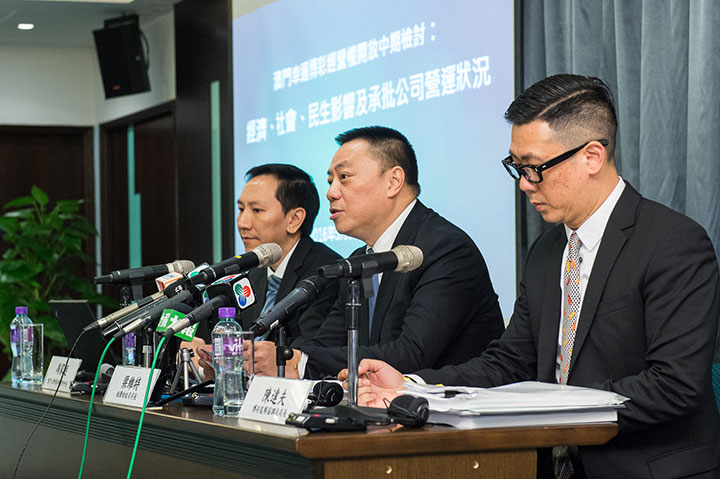MSAR Government Releases ‘Interim Review of Gaming Liberalization for Games of Fortune’ Research Report

Secretary for Economy and Finance Lionel Leong (middle) attends press conference of Research Report (Photo provided by Government Information Bureau)
The 'Interim Review of Gaming Liberalization for Games of Fortune in Macao: economic, social, livelihood impacts and operating conditions of the Concessionaires' research report was released on 11th May by the Office of the Secretary for Economy and Finance of the Macao SAR Government. The study addressed nine research topics in four categories, including the contractual and operating conditions of Concessionaires and Sub-concessionaires; economic, social and livelihood impact of the development of the gaming industry; and current situation of junket promoters. After analyzing the relevant data and statistics, the research team concluded that the six gaming operators have all fulfilled the capital commitment of their contracts. The development of the gaming industry has obviously created a positive impact upon the economy and society of Macao and at the same time exerted a negative impact. The proportion of local employees working for gaming operators is much higher than that of overseas employees. Non-compliance in a number of areas also showed a downward trend.
Analysis of the research shows that the development of the gaming industry has had a positive impact upon Macao's society and economy and synergetic effects were found alongside the gaming and non-gaming elements. Nonetheless, the negative impact - such as pushing up the rate of inflation, housing prices and business operating costs, the crowding out of SMEs, and the effect upon social values - needs to be continuously monitored and dealt with. Despite the positive role of junket promoters in the development process of the gaming industry, there are still bound to be problematic areas which need stronger regulatory efforts in order to enable a healthy and orderly development of the industry.
The research report cited data from the six gaming operators, which shows that their non-gaming elements generated an income of MOP23.2 billion in 2014. Currently, the total non-gaming spending of tourists in Macao is comparable to that of Las Vegas. However, the percentage is diluted as Macao's gross gaming revenue is far too high.
The report stated that synergetic effects exist in the gaming and non-gaming elements. Driven by the market, the non-gaming elements in the new investment projects of gaming operators have been given increasing importance with a view to tapping into different source markets, such as the middle-class and families.
The report analyzed the synergetic effects of the added value of the gaming and non-gaming industries. According to the added value calculated using the production approach with current prices in 2003 and 2013 (Production Tax deducted), the added value of the gaming industry increased by (6.9 times), while the hotel industry (11.4 times), wholesale and retail industry (7.4 times), construction industry (5.1 times), banking industry (3.5 times) and catering industry (3 times) all posted a certain increase. In addition, data has shown that tourists in Macao participating in gaming activities have also contributed to non-gaming spending, such as hotels, catering, retail, entertainment and tourism. On the other hand, tourists attracted by non-gaming elements have in turn driven gaming spending.
The impact of the gaming industry on the local economy, business environment of small and medium-sized enterprises (SMEs), society and people's livelihood are important elements of the research. The report points out that Macao is now among the forefront runners of the most developed regions in the world's economy thanks to gaming tourism. The most significant positive results include: rapid GDP growth, increased fiscal reserves, improved social welfare, foreign investment at record highs, increased labour productivity, relatively low unemployment rate sustained, and creation of favourable conditions to drive the development of other old or new industries such as hotels, luxury retail, catering, conventions and exhibitions, performance and entertainment, etc. Gaming liberalisation, in the period spanning 2002 to 2014, evidenced a net increase of nearly 35,000 companies in Macao, covering a wide array of industries.
Rapid development of the gaming industry has nonetheless brought about a degree of negative impact. Relatively obvious were the persistently high inflation rate, exerting stress on the daily lives of the grassroots and elderly people, acute rise in housing prices, making them unaffordable to the majority of the public, while some local SMEs faced difficulties due to the hike in operating costs. In addition, gaming-related crime increased, the economy and employment became too dependent upon the gaming industry, and traditional values were challenged, and so on.
For more details of related press releases, please visit the Gaming Inspection and Co-ordination Bureau website: www.dicj.gov.mo/web/en/news/Year-2016/mid-report/press/index.html